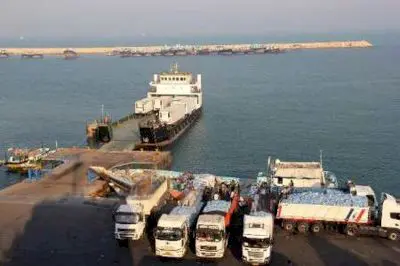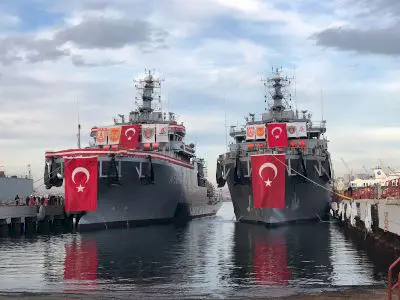Minerals Prices in Turkey
Turkey has a strategic and very good geographical location and is considered a crossroads of Northwest Asia and Europe. Scientists have identified over 4000 minerals of the earth's crust. Turkey's exports in 2018 in the competition compared to a year ago had a growth of 10.22 percent. Substances that are formed based on natural processes are called minerals. One of the most common items that travelers bring from Turkey will be souvenirs or gifts. Minerals can be identified by their physical properties, such as hardness, color, appearance (luster) and odor
Add your import and export orders to this list
Warning: Undefined variable $formTitle in /home/anbar/domains/anbar.asia/anbar/inc/html/desktop/orderform.php on line 10
Warning: Undefined variable $marketName in /home/anbar/domains/anbar.asia/anbar/inc/html/desktop/orderform.php on line 12
Warning: Undefined variable $location in /home/anbar/domains/anbar.asia/anbar/inc/html/desktop/orderform.php on line 12
If you want to trade in the , please join in Anbar Asia. Your order will be shown here, so the traders of contact you

Ataturk International Airport is the 11th busiest airport in the world and many Turkish airports are in very good condition and the number of passengers is very high. Some minerals can be detected by a little more features than the naked eye. Turkey exports the most to EU countries and the use of Turkish products is very common among the countries of the world. Providing quality material has a huge impact on your reputation as a trader
- Turkey Coal Market
- Turkey bauxite Market
- Turkey Galena Market
- Turkey Cassitrite Market
- Turkey Chalcopyrite Market
- Turkey Chromite Market
- Turkey Sphalerite Market
- Turkey Hematite Market

Substances that are formed based on natural processes are called minerals. They are characterized by following the conditions and structures of nature, but organic mines "have the structure, organs and conditions of a living agent" It is also obtained.
Read More ...
2. EnglandOne of the largest products in the top of Turkish exports to the UK is automobiles. Of course, exports to the UK do not only include cars, but also home appliances, furniture, textiles, and clothing. Consider that Turkey could export up to $ 11 billion this year.
Read More ... Also shown is the percentage share each export category represents in terms of overall exports from Turkey. Turkey’s top 10 exports accounted for under three-fifths (57. Turkey’s shipments of electrical machinery and equipment posted the third-fastest gain in value up by 6. The leading decliner among Turkey’s top 10 export categories was its number 1 product export vehicles which fell -15. For a more granular view of exported goods at the four-digit HTS code level, see the section Searchable List of Turkey’s Most Valuable Export Products further down below. Turkey has highly positive net exports in the international trade of knit or crochet clothing and accessories. In turn, these cashflows indicate Turkey’s strong competitive advantages under the knit or crochet clothing product categories. Overall Turkey incurred a -$49. Below are exports from Turkey that result in negative net exports or product trade balance deficits. These negative net exports reveal product categories where foreign spending on home country Turkey’s goods trail Turkish importer spending on foreign products. Turkey has highly negative net exports and therefore deep international trade deficits under the mineral fuels including oil category, particularly for processed petroleum oils, coal and petroleum gases. These cashflow deficiencies clearly indicate Turkey’s competitive disadvantages in the international fossil fuel market, but also represent key opportunities for Turkey to improve its position in the global economy through focused innovations. Global trade intelligence firm Zepol lists the following firms exporting from Turkey. The following searchable table displays 100 of the most in-demand goods shipped from Turkey during 2020.
Read More ...
Turkey's mineral exports increased by 48% in the period of 2021, compared to the same period of last year, reaching $4. China, the US and Spain were the top three exporting countries, with Indonesia, Uzbekistan, Hong Kong, Albania and Serbia newly added to the list of Turkey's export markets. The contribution of the mining industry to the gross domestic product of Turkey has massively increased from the 11 billion Turkish liras in 2009, to the 59. "Turkey has the largest reserves in the world in boron, perlite, trona, pumice, bentonite, pyrophyllite, feldspar, zeolite, barite, magnesite, chrome, lignite, gypsum, marble and cement raw materials," he said. Of the 90 mineral types produced around the world, Turkey has 80, he said. Welcome to Turkey Overview of Resources Metals Industrial Minerals and Gemstones Investment Sources. Turkey is a Eurasian country that is partly located in Southeastern Europe and partly in Southwestern Asia. Modern Turkey was founded in 1923 and ever since has enjoyed smooth economic progress and political stability despite many military coups. Turkey’s financial sector and banking system, which are properly organized and regulated, helped the country recover faster during the 2008-2009 global financial downturn. Turkey’s natural resources include iron ore, copper, coal, chromium, antimony, mercury, gold, celestite emery, barite, borate feldspar, pyrites, clay, limestone, magnesite, marble, perlite, and pumice. Turkey’s mining sector was established nearly 9000 years ago, and is very diverse with nearly 60 mineral ores and rocks. In 2010, the country was a leading producer of boron minerals and pumice in the world. The map of Turkey. Turkey’s gold resource potential is estimated to be about 23 million ounces. is a leading copper producer in Turkey. Turkey’s mining sector comprises mining subsidiaries of domestic conglomerates, metal and mineral traders, construction companies, and small family-owned companies. Turkey: Mining, Minerals and Fuel Resources. "Turkey: Mining, Minerals and Fuel "Turkey: Mining, Minerals and Fuel Turkey: Mining, Minerals and Fuel Resources.
Read More ...
Turkey is a country, situated mainly in Western Asia, with a small part on the Balkan Peninsula in Southeast Europe. The capital of Turkey is Ankara, but its largest city is Istanbul. Turkey has the 13th largest GDP by purchasing power parity (PPP) in the world. Turkey is the largest agricultural producer in Europe, and the sector employs more than 20% of the population. In addition to fertile agricultural land, Turkey has a wide range of natural resources including metallic and non-metallic resources. Turkey consumes a significant amount of natural gas, much of which is imported. Turkey’s strategic location makes it a natural "Energy Bridge" between major oil and gas producing regions and major consumer markets. Natural gas consumption in Turkey has increased over time to 48. Current gas production meets about 3% of domestic consumption requirements, but Turkey has approximately 675 billion cubic meters of shale gas reserves, especially in the southeastern region of Anatolia and Trace. Currently, Turkey’s Ministry of Energy and Natural Resources is exploring other potential reserve areas throughout the country, especially in Central and Eastern Anatolia, which is suspected to have shale gas potential. Turkey produces more coal than oil and gas, and this coal is primarily used for power generation. 5 million tons of hard coal, which accounted for about 40% of Turkey’s total energy production. Major hard coal deposits are located in the Zonguldak basin and Amasra, on the coast of the Black Sea in northwestern Turkey. The state-owned Turkey Hard Coal Enterprise (TTK) has the sole monopoly of hard coal production, processing, and distribution. Lignite is one of Turkey’s local energy sources, with a proven reserve of 15. The quality of lignite produced in Turkey is generally poor, and only 5. In Turkey, lignite is produced at a relatively low cost, making it more competitive than other energy sources. Turkey is the 37th largest country in the world, with a total land area of approximately 302,535 square miles. Approximately two-thirds of Turkey’s arable land is under crops at any given time, while the remainder is fallow. The majority of arable land in Turkey is located in the Aegean Region. Turkey 83 million tons of iron ore reserves, which are distributed throughout the country, especially in Anatolia, Erzincan, Malatya, and Sivas. One of the largest iron ore reserves in Turkey is the Avnik mine, which is located in Bingol Province, about 452 miles east of Ankara. In 2008, Turkey produced about 4. Due to low levels of iron ore production, Turkey relies on imports, mainly from Brazil, Russia, Sweden, and Ukraine. Turkey has several copper mines spread across the county. One of the largest copper mines in the country is the Cayeli mine, located in Rize Province, about 470 kilometers east of Ankara. The Murgul mine located in Artvin Province, about 465 kilometers from Ankara. Other copper mines in Turkey include the Damar mine, Cakmakkaya mine, Tirebolu mine, and Cevizlidere mine. Gold is mined on a small scale in several parts of Turkey. 5 tons of gold were mined throughout the country, making Turkey a major gold producer. The Çöpler mine is also one of the largest gold mines in Turkey and the world, with an estimated reserve of 6 million ounces of gold.
Read More ...
https://www.yenisafak.com/en/news/turkeys-mineral-exports-reach-438-billion-in-first-9-months-of-2021-3584305
https://www.worldstopexports.com/turkeys-top-10-exports/

